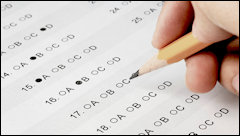 As if the City of Petersburg didn’t have enough problems recovering from its fiscal meltdown, now it has a school cheating scandal on its hands. The Virginia Department of Education discovered a suspicious pattern of answers in Standards of Learning (SOL) tests indicating that test-takers were coached to switch from incorrect answers to correct answers. Reports the Richmond Times-Dispatch:
As if the City of Petersburg didn’t have enough problems recovering from its fiscal meltdown, now it has a school cheating scandal on its hands. The Virginia Department of Education discovered a suspicious pattern of answers in Standards of Learning (SOL) tests indicating that test-takers were coached to switch from incorrect answers to correct answers. Reports the Richmond Times-Dispatch:
Some students at A.P. Hill Elementary School in Petersburg had to raise a hand after answering questions on state accountability tests last spring for a proctor to check their work. If the answer was correct, they could move on to the next question. If it was not, the students were told to check their work.
Others made rapid-fire corrections to wrong answers within minutes before submitting computerized tests, data show.
Five staff members who administered the tests have lost their jobs. One employee, who begged to be removed from testing duties, likened the test results rigging to the Atlanta cheating scandal.
Bacon’s bottom line: Needless to say, Petersburg school children are not well served when people believe they are performing better than they actually are. The only beneficiaries of cheating are the school staff, who win accolades for improved test performances.
Now, let’s go back to the previous post about the decline in the percentage of African-American students enrolled in America’s most prominent universities, and the explanation offered by the New York Times:
Experts say that persistent underrepresentation often stems from equity issues that begin earlier. Elementary and secondary schools with large numbers of black and Hispanic students are less likely to have experienced teachers, advanced courses, high-quality instructional materials and adequate facilities….
That’s the standard narrative, and it is woefully misleading. I discussed in the previous post how the biggest disadvantage suffered by African-American students is the much higher probability of being raised in fatherless families. All too often, they suffer a double handicap in attending failing schools. But why are their schools failing? Is it a matter of racism, discrimination, or unequal distribution of resources?
Petersburg, which I believe is the poorest-performing school district in Virginia, spent $11,179 per student on average in 2010 (the most recent data I could find), just a hair shy of the $11,316 state average. Of course Petersburg has more than its share of disadvantaged and special-needs students, but it’s not as if the school district has been living on a penurious budget.
If Petersburg students have less experienced teachers, fewer advanced courses, aging school buildings, and lesser-quality school materials, could one of the reasons be maladministration? We know the city government is a fiscal disaster. We know there’s staff-organized cheating in the schools, and that the cheating was caught by the Virginia Department of Education, not the school administration. Is it not possible that Petersburg has a severely dysfunctional school administration, and that inept management has compounded the challenges of poverty?
These are the questions we should be asking. Instead, we’re focusing on the statues of Civil War generals. Tear down every Civil War statue, you won’t help one Petersburg school child. Tear down the statues of every slave holder, and you won’t help one Petersburg school child. Tear down the statues of all those who held views that would be considered racist today, including Abraham Lincoln, and you won’t help one Petersburg school child. The obsession with statuary reflects a doubling-down on the paradigm of irredeemable American racism even Great Society institutions crumble around us. Innocent black school children are the most tragic victims of this blindness.


